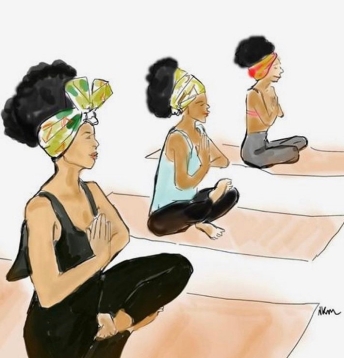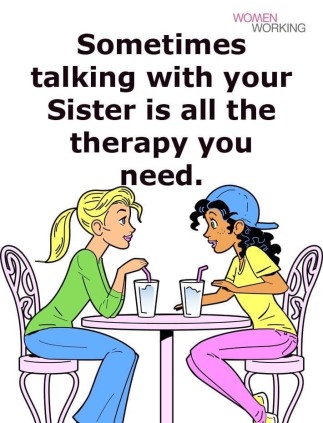My mother recently brought home a copy of Women’s Health’s November Mind Issue, suggesting I read it for an article on exercise and addiction. But before even opening the magazine, I was in awe with a picture of Kristen Bell on the cover, in a power stance, showcasing her fabulous abs. The text next to her arm read: “How Kristen Bell Got Her Abs Back | And Leveled Up Her Mental Strength.” Immediately I began flipping through the magazine, my curiosity (and affection for Kristen Bell) piqued. Passing by articles containing fitness tips, stories regarding sexual fluidity, and how to spot the signs of burnout; I finally landed on the piece about The Good Place actress.

In the article, Kristen Bell discussed how she first started speaking publicly about her mental health for a practical reason: She ran out of other topics to cover in a long series of interviews and her husband Dax Shepard suggested it. She opened up on how talking about mental health wasn’t easy for her in the beginning until she realized “that this is the shame that prevents people from talking about it.” Since then, she has taken every opportunity to shed light on mental health, detailing the many tools and treatments that help her manage her depression and anxiety.
ONE OF THOSE TOOLS IS DEVELOPING A “TOOLBOX” OF STRATEGIES THAT HELP WHEN YOU’RE FEELING OVERWHELMED… OR EVEN JUST MEH.
A mental-health toolkit – with a wide range of different tools, exercises, and techniques – of your own can help you deal when anxiety starts to creep up on you. “You don’t have to worry about, ‘What am I going to do next? Or what am I going to do when I feel this way?’ You’re already prepared for these situations when they come” says Nicole Issa, PsyD, a Rhode Island-based psychologist.
The more tools you have in your toolbox, the more options you have when you are confronted with a difficult situation.
This is extremely important because not every tool is going to be effective in every situation. As Abraham Maslow once famously said, “If all you have is a hammer, then everything looks like a nail.” This quote refers to the cognitive bias that is known as the “law of the hammer,” which describes our tendency to have an over-reliance on a tool simply because it is familiar to us. But just like you can’t build an entire house with just a hammer, you can’t build a better life with just one “mental tool.”
For this reason, it’s always a good idea to diversify our toolbox to better equip ourselves for the various situations we find ourselves in life.
Some clinicians suggest getting a binder, setting up tabs and listing every resource that’s available to you. However, it does not need to be that evolved. Women’s Health has put together a great ‘fill in the blanks’ worksheet to help you get started on building your own kit. (You can also use the Notes app in your phone to list your ideas or keep a journal to refer to.)
To help you stay in a good mental place, below are some possible ‘tools’ you may want to incorporate into your own mental toolbox.
EXERCISE
 For Kristen Bell, this is her #1. She told Women’s Health: “Exercise should be the first stop for anyone who experiences depression or anxiety because it encourages serotonin and endorphins.” She continues by saying, “I feel so much more centered, patient, capable. It sets the next 48 hours for me.”
For Kristen Bell, this is her #1. She told Women’s Health: “Exercise should be the first stop for anyone who experiences depression or anxiety because it encourages serotonin and endorphins.” She continues by saying, “I feel so much more centered, patient, capable. It sets the next 48 hours for me.”
The perks of physical activity are enormous. But if you’re forcing yourself through an hour-long torture session at the gym, it’s going to be really tough to make it a habit and therefore reap the benefits.
Opt for trial and error and discover what kind of physical activity is best for you.
- Try going to the gym and just doing a 20-minute workout – even if 10 of those minutes is spent sitting on a mat, in your cute workout clothes, looking at your phone. At least you showed up. Over time, increase the amount of time you spend working out.
- Sign up for a class – the set time every week may motivate you to use that set hour or hour and a half to focus on your needs.
- Find a buddy. There’s strength in numbers – literally. Research suggests individuals perform better when supported by others. Additionally, if you tend to be the one avoiding workouts, finding someone who’s more motivated and reliable than you, may help you stick to your workout plans.
- Try self-led yoga (my favorite exercise choice). While there are so many good YouTube channels with teachers that make being an at-home Yogi a breeze, Yoga with Adriene is one of my favorites. She has lessons for back pain, weight loss, mediation and ab workouts – all of which you can do from the comfort of your own home (with a Spotify playlist playing in the background).
- Take the stairs, go for walk around your neighborhood, do squats while you brush your teeth.
Determine what kind of physical activity is your ‘jam’ and then commit. Having that go-to type of movement in your toolkit can help in specific moments when you’re feeling stressed or down and can help create feelings of empowerment.
AFFIRMATIONS
“If you believe the phrase ‘we are what we think’, then life truly stems from your thoughts. But we cannot rely purely on thoughts; we must translate thoughts into words and eventually into actions in order to manifest our intentions. This means we have to be very careful with our words, choosing to speak only those which work towards our benefit and cultivate our highest good.” – Dr. Carmen Harra, best-selling author, psychologist and relationship expert.
The word affirmation comes from the Latin affirmare, originally meaning “to make steady, strengthen.”
Affirmations do indeed strengthen us by helping us believe in the potential of an action we desire to manifest. By verbally affirming our dreams and ambitions, we are instantly empowered with a deep sense of reassurance that our words will become reality. By actively reciting a positive and inspiring thought to ourselves, we make it “stick” inside our brains more. This restructures the dynamic of our brains so that we truly begin to think nothing is impossible – proving to be a successful method of self-improvement.
For example, an individual may repeat the thought “I have a lot of positive qualities and strengths” 3 times every morning to help build more confidence and self-esteem.
Much like exercise, affirmations raise the level of feel-good hormones and push our brains to form new clusters of “positive thought” neurons. In the sequence of thought-speech-action, affirmations play an integral role by breaking patterns of negative thoughts, negative speech, and in turn, negative actions.
DO SOMETHING THAT HELPS YOU LIVE IN THE MOMENT
Dr. Chole Carmichael, PhD, a New-York based clinical psychologist says, “If we don’t have a way of consciously shutting off our to-do list, we run the risk of constantly feeling like we’re on the hamster wheel.” Nicole Issa, PsyD adds, “It is essential to engage in restorative activities. It means you’ll be less likely to lean on destructive ways that people manage their emotions, such as binge eating, overconsumption of alcohol, etc.”
CBD is a popular natural remedy used for many common ailments and is one of over 100 chemical compounds known as cannabinoids found in cannabis or marijuana plant, Cannabis sativa. However, the main psychoactive cannabinoid, Tetrahydrocannabinol (THC) is not found within CBD – hence giving you the medicinal benefits of the plant without the high. It can reduce pain, alleviate cancer-related symptoms, reduce acne, treat neurological disorders like epilepsy and multiple sclerosis, benefit heart health and reduce anxiety and depression.
I have a friend who uses CBD oil to help her turn off her mental to-do list during the day. (Something Kristen Bell has stated that she does daily as well.) I use CBD oil to help me sleep at night, as it helps me ‘turn off’ the overthinking that typically keeps me up. A few drops on my tongue, a spritz of lavender and chamomile on my pillow, and I am out like a light.

Poor sleep is linked to physical problems such as weakened immune system and mental health problems like anxiety and depression.
If you find yourself obsessing, break the cycle by using CBD oil, jade rolling before bed, drinking sleepy-time tea, reading a book or whatever relaxing activity that works for you. “The more consistent you are, the more benefits you’ll have,” Issa says. If you build this habit, over time it will signal to your brain that it’s time to relax and engage with the present.
REFRAMING
Optimistic thinking is a resiliency skill that helps people overcome adversity and reach life goals. Positive reframing, a common tool in Cognitive-Behavioral Therapy, is when an individual takes a negative and destructive belief and looks at it from a more positive and constructive perspective. For example, instead of thinking “No one likes me,” a person may reframe that belief into “People will like me if they get the chance to know me.”
When we reframe a negative thought, it’s not about ignoring the facts of reality, but merely looking at the fact from a different angle that we find more inspiring and motivating.
This is a powerful way to transform our thinking.
EXPLORE COPING MECHANISMS
When you’re flustered, it’s basically impossible to come up with a productive way to deal in the moment, says Dr. Carmichael. “To have a little foresight and think about something helpful you can do before you even get upset helps you have a healthy tool that will make moments of frustration go smoother – so you’re less likely to spiral.”
 Venting frustrations often provides cathartic release and is probably the first tool I use when having a bad day. Because you sometimes just need to vent to get it out of your system so then you can move on. “The immediate feelings of relief derived from such letting go can hardly be overstated,” says clinical psychologist Leon F. Seltzer.
Venting frustrations often provides cathartic release and is probably the first tool I use when having a bad day. Because you sometimes just need to vent to get it out of your system so then you can move on. “The immediate feelings of relief derived from such letting go can hardly be overstated,” says clinical psychologist Leon F. Seltzer.
He notes how self-expression can elicit much-needed comfort as well. “Doubtless, at some point in your life, you’ve benefited from the comfort and consolation of another person’s supporting and validating you when you shared some distressing experience with them. Just in itself, self-expression feels good. But what can help you feel even better is being listened to by someone who genuinely seems to care about you. For through their warmheartedly ‘getting’ your discomfiture and commiserating with you, your frustrations feel all more rightful and legitimate.”
You can also choose to vent to yourself by writing it down. Keeping a diary or journal is another common tool people use to improve their mental health. Our thoughts and feelings can often be messy and distorted when they are just floating around in our brains, but when we write them down it forces us to reflect more clearly and organize our thoughts in a more coherent way – which can help us clear our heads and “digest” our experiences more easily. Additionally, we can often go back to our writings at a later date and discover how much we’ve grown over time.
Other tools for your toolkit can include anything that makes you happy. It can be treating yourself to your favorite food or getting a pedicure during your lunch. Maybe it’s buying a nice bath product or ‘unplugging’ once you get home.
The point is to have many different options to go to, as having multiple choices available to you during rough times can be a very powerful thing.
For example, say you had a rough day at work – people were treating you rudely, you made a bunch of mistakes that made the boss angry, and you ended up spilling your coffee on yourself before a big presentation.
How do you want to bounce back from this day?
Repeat a few positive affirmations to boost your confidence back up? Do a quick meditation session to relax your mind and relieve some stress? Write in your journal to reflect on your experiences and clear up your mind? Go to the gym and take out your frustrations on the equipment?
The more tools you have at your disposal the better you’ll be able to navigate the ups and downs of your life.
Sources:
- Jones, Alexis. Take This Mental Health Challenge with Kristen Bell. Women’s Health. 2019.
- Nied, Jennifer. Kristen Bell Says She Takes CBD Oil Daily to Manage Her Depression and Anxiety. Women’s Health. 2019.
- Metrus, Lindsey. I Hate the Gym: Here’s How I Get in Shape Instead. Byrdie. 2019.
- Kubala MS RD, Jillian. 7 Benefits and Uses of CBD Oil (Plus Side Effects). Healthline. 2018.
- Harra PhD, Carmen. 35 Affirmations That Will Change Your Life. Huffpost. 2013
- Steinberg, PsyD, Talya. “Positive Reframing” as Optimistic Thinking. Psychology Today. 2012.
- Handel, Steven. Build a “Mental Toolbox” to Help You Navigate Through Rough Times. The Motion Machine. 2017.
- Boyes PhD, Alice. 4 Ways to Deal with a Horrible, No-Good, Really Bad Day. Psychology Today. 2015.
- Suval, Lauren. Benefits of Venting Go Both Ways. Psych Central. 2018.




Awesome stuff.
LikeLiked by 1 person
Thanks!
LikeLike